
Beijing 2008
Written by: Rik
Date posted: September 30, 2021
- Genre: Sport
- Developed by: Eurocom
- Published by: Sega
- Year released: 2008
- Our score: 7
After doing this for so long, the question of what might signal a diminishing interest in the process of rummaging around in PC gaming history does occasionally cross one’s mind. However, as long as a brief couple of hours spent half-watching a real-life sporting event prompts frenzied internet searches that end with the purchase or download of a long-forgotten game, then we’ll still be in business.
The Beijing Olympics of 2008 stick out as being of sufficient inspiration to prompt a review of Mindspan’s 90s keyboard-smasher The Games: Summer Challenge, a decent enough and sporadically amusing effort that remains memorable for my repeated failures at the equestrian event. And, without wanting to turn this website into an endlessly circular exercise of self-reference and perpetual nostalgia for its own past, revisiting the words of my much younger self did raise a faint smirk on this occasion, having not only veered towards, but now passed through, my thirties. (I reached the big 4-0 having failed to noticeably improve my aerobic fitness, although I do still retain most of my hair and have managed thus far to avoid succumbing to the bottle. I’m going to call that two out of three).
Having covered one or two of the genuine oldies in the past, it was interesting to fast forward a little to see what innovations and subtleties may have been introduced by a comparatively modern athletics tie-in. Over the years the genre seems to have had a bit of a love-hate relationship with its roots in the joystick waggling/button bashing era of Konami’s Track and Field, with a sense on the one hand that things should have perhaps moved on a bit; on the other, an acknowledgement that it was part of what was expected, and even wanted, by an audience as likely to be seeking a lightweight update of the previous formula as they were a genuinely comprehensive simulation of a wide cross-section of Olympic sports.
Retaining the attention of the casual enthusiast wanting to be good at as many of the different events as possible without too much effort seems, unsurprisingly, to have been a priority guiding the development of Beijing 2008, which essentially boils its 38 events spanning track, field, pool, gym and, er, ‘other’ down to a series of relatively easy to grasp mini-games, a number of which call for some good old-fashioned joypad abuse.
For the solo player, it’s pretty much a straight choice between practice and the full Olympics, although if you have some friends who are both sufficiently interested in games based on sporting events that have long since passed and willing to come to your house, there is an option of local multiplayer, across multiple custom events. (Online play has of course long since been discontinued).
There’s also an option to customise your Olympic squad, a process that doesn’t involve any named athletes, but rather choosing, from a limited number of pre-sets, the appearance of the athlete representing your country in each event. (If you don’t bother, then it will be random each time you start, which is a bit weird, but not something that disconcerted me to the extent that I was willing to go through and choose generic athletes for 38 different events).
Exactly what the official Olympics licence gets you in the modern age was something I wondered about going in, and it certainly doesn’t extend to real names, likenesses and performance stats. The kits all seem rather unofficial too, with the Team GB branding replaced by something rather reminiscent of the Brexit Party. (Although to be fair, I did look back at the real kit and it actually isn’t too far off; still, this was when the flag was kept to things like the Olympics rather than being a required symbol of loyalty to HM Government to be displayed at all times). An extended opening ceremony cut-scene doesn’t seem to have been a priority, either, and I watched for ages until I realised that the camera endlessly circling the stadium with fireworks going off was going to be the full extent of it.
I imagine the expense and legalities of licensing individual athletes would make such an endeavour more hassle than it’s worth; although even with unlicensed (but named) competitors, there is potentially a good game that involves managing a squad with varying abilities in different events and a career mode that matches objectives to the relative expectations and abilities of a particular nation (i.e. Great Britain anticipates a load of cycling medals, etc).
This isn’t it, though. Instead, the Olympics are the same, whichever nation you choose, and the only concession to career progression of any kind is the slightly nebulous concept of overall squad stats, which can be upgraded across all athletes as you earn points in various events along the way. Each day starts with you allocating these points across a handful of vague-sounding and undefined categories, then doing your best in the five events taking place that day, with a minimum overall requirement to progress. In between, there are optional challenge days, which allow you to potentially earn more points, but at the cost of fatiguing your team, the management of which also has a points cost. There’s also an option to spend points on a reserve of slow-motion time, which can be deployed during any event to give you a brief period of advantage, if needed.
It all works well enough, with a steady progression of difficulty, and some allowance made for the puny stats of your team at the start. You can summon a quick in-game tutorial for every event prior to competing, although advance engagement of the training mode is probably advisable. As ever, it’s a matter of working out which events are easy or you happen to be particularly good at and then tuning up the others to make sure you progress.
Of the 38 on offer, I’d say only 3 proved to be completely unfathomable: judo, which relies on secret button combinations (the manual’s words) to perform a throw and so just ends up being a few minutes of minor tussling before the inevitable loss; kayaking, which seems like a cruel and unusual sport at the best of times, whose time penalties can rule you out of contention within moments, leaving you to half-heartedly paddle through to inevitable last place; and skeet shooting, the extended nature of which did at least provide some comedy value, as my fella was given an extended opportunity to take aim and miss from every conceivable angle. Thankfully, you’re never required to perform well across all five events, meaning total failure in one of them never ruins your chances of progressing overall.
And so to the rest: there’s the track events, which as you might expect, make use of brute force, with the option of waggling the left or right stick or bashing buttons alternately. (It should be said at this point that the keyboard is an option, but the whole thing sort of assumes the possession of an Xbox 360-era pad or later: keys do work, but the game doesn’t give you much help in terms of using them, with the options menu allowing you to redefine keyboard controls for the pad’s directional movement and face buttons, but making no mention of the shoulder buttons, leaving you to guess which of the keys double up. And the tutorials still refer to the pad controls regardless).
For the 100m, 200m and 400m, as well as the two hurdling events, you have to gently squeeze the trigger to get set before the gun and then waggle (or bash, although that generally seems less effective) for all it’s worth. The main danger is in a false start, so you tend to start slowly rather than risk it. Otherwise, these are as you’d expect. For the longer races (800m and 1500m), there’s no getting set, and instead it’s a case of managing your runner’s stamina by staying in the pack to conserve energy before choosing your moment to try and break away. It’s a simple but effective way of dealing with these races, although I had some difficulty co-ordinating the waggling of the right stick with moving my runner in and out of lanes with the left one.
When it comes to field events, there’s a limited amount of waggling and/or bashing involved in the build up to the long jump, triple jump and javelin, while the shot and discus rely on rotation of a stick to build power. Then, it’s largely a case of hitting the trigger at the right moment, setting the angle to (your classic) 45 degrees and hoping you haven’t fouled, although the javelin relies on sweeping the left stick back and then forward to set the angle, which has more potential for variable results. The hammer is based on rotating a stick in time with an on-screen marker, the high jump on matching button presses to footsteps in a rhythm-action style, while the pole vault needs you to hit a point on a gauge, the window of time for which is determined by preparatory waggling, to complete the jump successfully.
Again, these are all balanced quite nicely, although one odd quirk of both the long and triple jump events seems to be that the jump you witness only bears a slight resemblance to your actual distance, almost as if the game only has a limited set of outcomes (good, medium and terrible) to show you rather than crunching the numbers to show you a representation of your actual performance.
The four swimming events are similar to the sprinting ones on the track, including the pre-gun power bar, except waggling is no longer an option (although you can still button bash). Instead, you have to rotate the two sticks in opposite directions, pausing only to time your turn with a press of the trigger button. This requires a level of mental and physical dexterity that did prove a challenge in my advancing years: as the limbs tired, the brain would periodically forget which way I was meant to be rotating on each side, prompting a furious struggle to get back in rhythm.
Now, I never really found the old ‘joystick waggling’ willy jokes all that funny, but it has to be said that there were times of desperate and sweaty struggle during the swimming events when I really hoped that the neighbours weren’t looking. To make things worse, the direction in which you need to rotate each stick changes between the different types of race, so you’ll need to be sure to double-check the tutorial if you’re as easily disoriented as me.
Diving also involves some co-ordinated movement of both sticks, although this is more of a smooth and steady rotation, in line with the on-screen guidance, than the furious pace of the swimming. There’s an element of more gentle employment of the direction sticks for balance and technique in the gymnastics events too, although some alternate this with timing-based mini-games, while others require some mid-event accumulation of power with bashing of the trigger buttons. The floor exercise, meanwhile, is a simple matter of matching buttons to the placement of feet, as per the high jump.
Skeet aside, the shooting events are a fairly straightforward point and move, with an element of needing to hold your nerve under pressure, while archery is the usual ‘wobbly target and adjust for wind’ affair. Which leaves weightlifting, a mixture of techniques used in field and gymnastics events; table tennis, which is hardly a comprehensive representation but remains a decent little mini-game; and track cycling, which is the same blend of bashing, rotating and strategy you’d get if you mixed the sprints and long distance running with swimming: it’s a case of managing your own real-life stamina as well as that of the virtual cyclist, with regular rotation of the team lead important to maintain.
And that’s it. As a whistle-stop tour of events, it was thoroughly enjoyable stuff, ticking most boxes in terms of what you might want from an Olympic tie-in. The only real disappointment comes in the presentation, which is fairly threadbare and low-key in places. We already mentioned the opening ceremony: similarly, your reward for getting through the final day (4 gold medals out of 5) is, essentially, the credits rolling over a repeat of the intro.
This was particularly disappointing as I had come so close a few times, with a best of 3 golds and 2 silvers, only to briefly then lose my mojo in subsequent attempts at the long jump, to the extent that I became convinced my joypad was broken, or there was a bug in the game. For a couple of deranged evenings, I was swapping controllers, trying keys, uninstalling the game, you name it… It turns out there’s just a very specific window for pushing the trigger button to jump, which I had suddenly lost the knack for. Exhausted but triumphant, I awaited the reward for glory, only to receive nothing but the names of those responsible for developing the game in return.
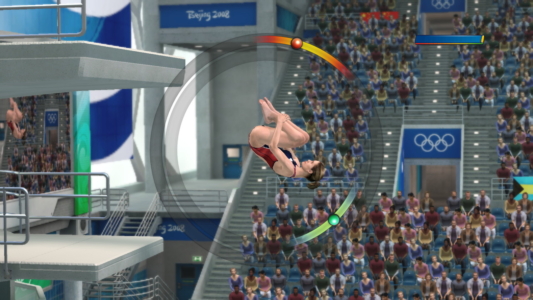
While it may be tempting to choose an easy dive, it usually pays to choose something difficult and maximise the points you earn rather than try and pull off perfection.
There’s also a lack of polish elsewhere: you don’t get a medal, for example, which seems like a fundamental omission. That’s the whole point of the Olympics! You do get to witness a presentation of sorts, but your athlete just stands on the podium, bare-necked, while the national anthem plays. There’s also the inclusion of slightly dispassionate and very brief commentary, with a momentary appraisal from generic American voices offered at the action replay stage. It doesn’t really add anything, and certainly doesn’t give the impression that the TV coverage, so much of which relies on specialist knowledge and discussion of individual competitors, is being replicated. (Your opponents here are unnamed drones, incidentally, and you don’t get to see what they’re up to when you’re not on screen).
And finally, in yet another example of cool-sounding network features that will inevitably later become obsolete, all leaderboards and performance tracking stats are linked with a now-defunct Gamespy service, and so you have no way to see your best performances or even a summary of what you achieved across the games or try and beat them.
It makes repeat plays unlikely, although in fairness there’s little incentive to return immediately, once you’ve made it all the way through the 17-day event once. I’d say it’s probably worth digging out again the next time Olympic fever hits, though: some presentational issues aside, Beijing 2008 is generally a good time, with very few genuinely stinky events, and a nice career mode that offers both a lightweight challenge and a good taste of the Summer Games as a whole. You can’t really say fairer than that. As a modern(ish) interpretation of the old-school waggler, it’s a solid effort.

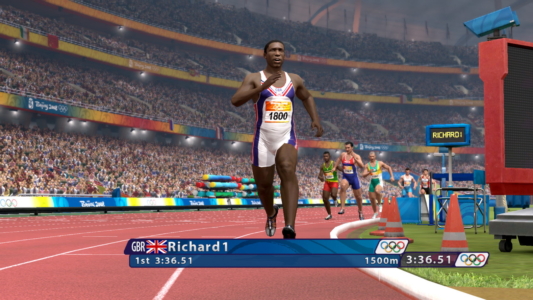
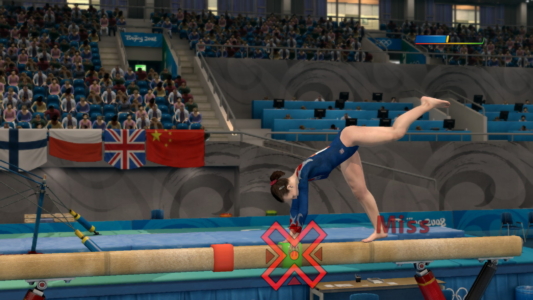

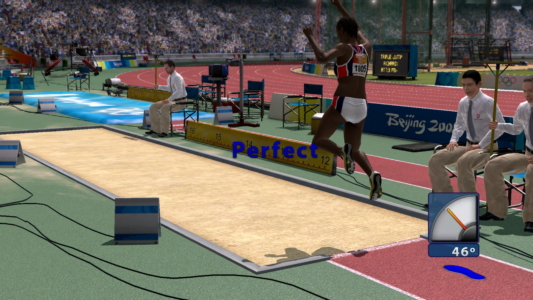
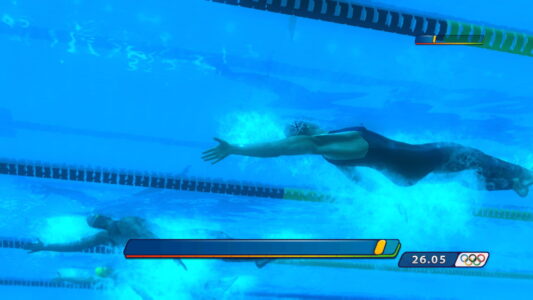

 Posts
Posts